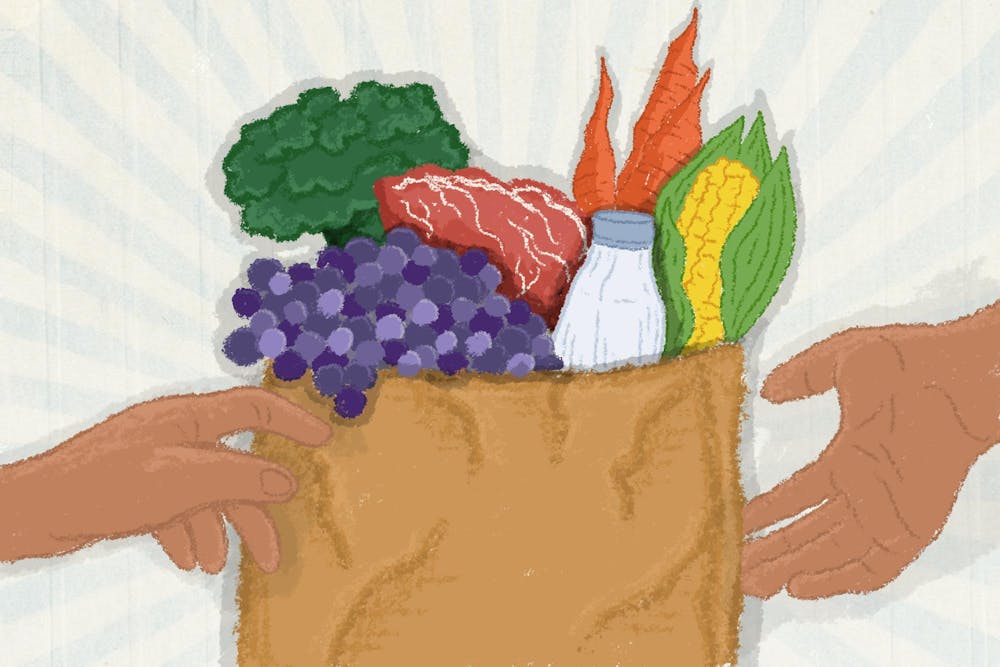USC food organizations such as the Gamecock CommUnity Shop and FoodShare South Carolina have noticed an uptick in demand since Nov. 1, when Supplemental Nutrition Assistance Program benefits were suspended for over 550,000 individuals in South Carolina.
The ongoing federal government shutdown has suspended SNAP benefits indefinitely across the country, and many South Carolina residents are seeking assistance at food banks to make up for the loss in financial aid.
Gamecock CommUnity Shop
The Gamecock CommUnity Shop provides free food, clothing and school supplies to USC students, faculty and staff. Shop customers register and are allocated 40 points per month to “spend,” with most items valued at one point.
Chandler Dailey, the Gamecock CommUnity Shop volunteer coordinator and second-year accounting and political science student, said the CommUnity Shop saw an average of 5,000 student visits a month as of Oct. 30, a 300% growth rate from the same time last year.Dailey said increased economic need among students has likely been a factor in the growth.
“Economic factors like inflation (are) making it difficult to pay for things. Prices are skyrocketing,” Dailey said. “A good many of our students can only work for about 20 hours a week … so they’ll come to us because they’re making the same amount of money as they were last year, but things are more expensive.”
While the CommUnity Shop does not monitor whether visitors are receiving SNAP benefits, many are likely receiving assistance, Dailey said. However, students of all types utilize the CommUnity Shop, even those ineligible for SNAP.
First-year graduate piano pedagogy student Michail Chalkiopoulos said both the shop’s convenient location and financial benefits draw him to shop there. Chalkiopoulos shops at the CommUnity Shop twice a month, primarily for fresh produce, he said.
With the halt of SNAP benefits, Dailey said food pantries across the state can expect an increase in visitations. The CommUnity Shop is a completely donation-based service and is trying its best to prepare for the influx, Dailey said.
“Our biggest thing has just been asking donors for donations, monetary donations, (which) we are able to use to purchase things from Harvest Hope,” Dailey said.
Harvest Hope is a South Carolina based food bank that provides food to 20 counties in the state. Dailey said there’s been a limited amount of food available from Harvest Hope, as it provides food donations to pantries statewide. Food pantries across the state, including Harvest Hope, have been under strain and faced shortages since SNAP was suspended.
"We like regularly collaborate with Harvest Hope, but because we're so niche in that we only serve the campus community, we're not really collaborating with any outside food banks", Dailey said.
Dailey said the CommUnity Shop also receives food donations from Sustainable Carolina, the Food Recovery Network, Food Lion and the College of Hospitality, Retail and Sport Management.
The CommUnity Shop has also been working to put on events to drive donations, such as the recent LSU-USC food fight, by partnering with other campus organizations.The donations didn’t last long, since they distribute about 1,000 pounds of food per day, Dailey said.
“(The food fight) definitely did garner a lot of support, and we're super grateful for all the food that was donated during that time,” Dailey said. “We got a lot of food that students really seemed to enjoy, but it's almost all gone.”
“It’s been a real struggle to keep food on our shelves,” Dailey said.
FoodShare South Carolina
Since Nov. 1, FoodShare South Carolina has seen an influx of both demand and donations as they coordinate the distribution of fresh produce across the state.
A program of USC's Medical School, FoodShare South Carolina is a nonprofit that provides boxes of fresh fruits and vegetables to all South Carolinians at a discount rate. The small boxes are sold for $20, but cost just $5 when purchased with SNAP funds.
FoodShare South Carolina sells three different types of boxes that each contain nine to 11 types of fruits and vegetables, FoodShare South Carolina Director of Marketing Gordon Schell said.

Schell said that as the suspension of SNAP continues, the organization will subsidize the boxes through donations so recipients only have to pay $5, even in the absence of benefits.
“Fruits and vegetables are very expensive, so we were brainstorming how (we can) continue to make this accessible for folks that now don’t have SNAP because it’s been frozen because of the federal shutdown,” Schell said. “We’re thankful for the donations that we’ve received that will allow us to still provide that box at that lower cost for folks, even if it’s not on SNAP.”
There are no restrictions on who can buy produce from FoodShare, Schell said. The produce sales are evenly split — about half are bought with cash, and the other half with SNAP, Schell said.
“Our primary goal and primary focus are those families that may be struggling more financially, especially now with SNAP being frozen ... but anybody can walk in the door and buy a box,” Schell said. “We don’t ask for income verification … We’re trying to make access as easy as it can be.”
FoodShare is unable to provide the produce for free, but the organization has been directing people who call requesting free food toward other food pantries, Schell said.
FoodShare distributes their fresh food boxes in 31 South Carolina counties, according to its website. Schell said FoodShare has received donations to subsidize fresh food boxes in Richland County, and are helping support Marlboro, Lawrence and York counties.
“Our community is hurting right now,” Schell said. “People are struggling to put food on their table, and so the fresh food box is a way that folks can help put food on their table at an affordable cost.”

